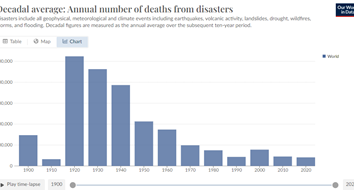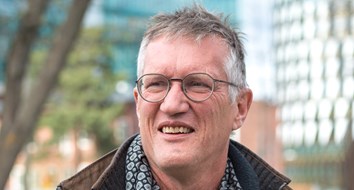David Mamet made a name for himself as an award-winning playwright and one of the most successful screenwriters in the world. (His Hollywood writing credits include The Untouchables, Hoffa, Wag the Dog, Ronin, and the adaptation of his critically acclaimed play Glengarry Glen Ross.)
Recently, however, the Pulitzer Prize-winning playwright set his pen to a different task. Writing an op-ed for the Wall Street Journal, Mamet delivered a scathing critique of how policymakers have handled the coronavirus pandemic. He begins with a simple question.
“What happens when the most respected authorities get it wrong and ruin lives and economies?” he asks.
The answer? Not much.
Mamet traces the history of several powerful people―from Frederick Lindemann, a key advisor to Winston Churchill, to Trofim Lysenko, Joseph Stalin’s science advisor―whose decisions led to catastrophe.
Lysenko, for example, believed plants could be re-educated, just like people. He believed that peas and wheat could be grown in the harsh Eurasian winters, and his ideas—tragically—were eventually adopted by the Soviet Union.
“The Soviet ministry of agriculture, acting on Lysenko’s bogus theories, managed to ruin crops all over Eurasia and starve as many as 10 million people,” Mamet writes. “Later his ideas influenced agriculture policy in Mao’s China and killed several million more.”
Despite the atrocity, Lysenko was not banished, imprisoned, or executed (as one might expect in the USSR in the 1920s and 1930s). Instead, he thrived.
By 1940 Lysenko was the director of the Institute of Genetics at the USSR's Academy of Sciences, where he’d use his political power to suppress dissent and imprison his critics. By 1948 Lysenko was “the total autocrat of Soviet biology” and his ideas had become scientific dogma, even as they got crazier.
“[Lysenko] claimed that wheat plants raised in the appropriate environment produce seeds of rye, which is equivalent to saying that dogs living in the wild give birth to foxes,” notes Britannica Online. “His fundamental, continuing argument was that theoretical biology must be fused with Soviet agricultural practice.”
Despite the lunacy of his ideas, which resulted in millions of deaths, Lysenko outlived Stalin and held power throughout the reign of Nikita Khrushchev. Even long after his ideas were discredited, Lysenko retained his degree and academic titles. He died peacefully in 1976 and was buried in Kuntsevo Cemetery.
This is the lesson of governmental power, Mamet says.
“We are all, in a sense, fools, since no one person can know everything. We all have to trust others for their expertise, and we all make mistakes,” says Mamet. “The horror of a command economy is not that officials will make mistakes, but that those mistakes will never be acknowledged or corrected.”
In a sense, what Mamet is saying is a variation of F.A. Hayek’s knowledge problem, which is the realization that no single mind can handle the vast amount of "local knowledge" needed to solve social problems. Those problems can only be solved by society and the economy as a whole, with each member specializing in their own piece of the puzzle, and the puzzle pieces fitting together through intricate voluntary cooperation. When "the experts" assume they're smart enough to centrally plan society, they only manage to throw all this intricate "spontaneous order" into chaos.
Central planners, as Hayek and Mamet agree, ruin societies through ignorant meddling. Not only that, as Mamet implies, central planning actually pollutes truth and knowledge.
This certainly appears true in the case of lockdowns.
Five months ago, I asserted it was becoming rapidly clear that lockdowns were the biggest “fail” on the part of the expert class since the Iraq War. In an attempt to protect people from a virus they knew little about, experts took the extreme and authoritarian step of locking down much of the economy, ordering people to be confined in their homes and forcing “non-essential” businesses to close their doors.
It was the most expansive infringement of individual freedom in modern history, and the results were catastrophic.
One prominent study places total pandemic costs at $16 trillion—about four times the federal budget. Americans are suffering from depression at record rates and 150 million people are projected to fall into extreme poverty worldwide. In the US alone, tens of millions of jobs were lost and millions of businesses are closed or on the brink of closure.
One of these businesses is a restaurant owned by a friend of Mamet.
“He is going broke,” says Mamet. “He had seating outside, but winter approaches and heaters are back-ordered until next spring. He is holding on.”
How many people are in this man’s shoes? And for what?
The #lockdowns summed up in one headline. pic.twitter.com/ihPZxUCMU1
— Jon Miltimore (@miltimore79) December 4, 2020
After warnings to avoid travel, Denver Mayor Hancock flies to visit family for Thanksgiving https://t.co/unKvucNaPL
— 9NEWS Denver (@9NEWS) November 25, 2020
The lockdowns, which even the once pro-lockdown World Health Organization now advises against using, are now primarily theater (beyond the destruction they cause). A day rarely goes by without a politician being caught violating his or her own social distancing order, and for good reason. The virus is not as deadly as previously believed for the vast majority of people, and compelling evidence exists that shows lockdowns simply aren’t effective, or at least they are no more effective than voluntary measures.
But this pandemic is no longer about science. Take schools. It’s difficult to find public health experts or media who still believe schools pose a serious threat of spreading the virus.
CDC Director: "the data clearly shows us that you can operate these schools in face-to-face learning in a safe and responsible way."
— Corey A. DeAngelis (@DeAngelisCorey) December 2, 2020
And there’s an obvious reason for this.
“If you look at the data, the spread among children and from children is not very big at all,” Dr. Anthony Fauci, the nation’s top infectious disease expert, recently admitted. “Not like one would have suspected.”
Despite overwhelming evidence from numerous countries that schools are not the motor of this virus, tens of thousands of US schools across the country remain closed.
Why? Mamet thinks he knows.
“The virus here is government—or at least the incompetents who advise our rulers and cannot admit the legitimacy of dissension,” he wrote.
Mamet is not wrong. As the economist Ludwig von Mises pointed out years ago, the central planner cares about one thing above all else.
“What those calling themselves planners advocate is not the substitution of planned action for letting things go. It is the substitution of the planner’s own plan for the plans of his fellow-men,” Mises wrote in Socialism: An Economic and Sociological Analysis. “The planner is a potential dictator who wants to deprive all other people of the power to plan and act according to their own plans. He aims at one thing only: the exclusive absolute pre-eminence of his own plan.”
Mises’s insight that the central planner―i.e. the state― becomes consumed with her own plan above all else is true.
It was true of Lysenko when he became convinced that wheat could produce rye seeds and peas could flourish in frigid climates. And it’s true today when experts and politicians insist that their nonsensical directives are actually protecting people.
The sheer banality of these orders has given lie to the notion that public health is driving the lockdowns.
— Jon Miltimore (@miltimore79) December 3, 2020
Churches? Closed. Strip clubs? Sure.
Restaurants? Sorry. Liquor stores? Okay.
Private gatherings? Nope. Lottery ticket sales? You bet! https://t.co/0xWCmVafGf





